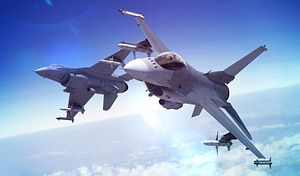The White House is pushing ahead with the sale of up to 66 Lockheed Martin F-16 Fighting Falcon Viper (V) Block 70 multirole combat aircraft to the Republic of China Air Force (ROCAF), according local media reports.
The Trump administration has notified Congress on August 15 that it would submit the arms deal package for informal review, sources familiar with the sale told The Washington Post. The Senate Foreign Relations Committee and House Foreign Affairs Committee are expected to receive the submission of the arms sale to Taiwan for informal review from the U.S. Department of State by Friday evening, according to two sources. Congress is not expected to raise objections.
This latest move by the Trump administration comes amid accusations by U.S. lawmakers of both parties that the White House has delayed approving the $8 billion weapons sale to soften the ground for a future U.S.-China trade deal and use it as a bargaining chip during ongoing trade negotiations. Approval of the F-16 deal was reportedly deferred after trade advisers appealed to U.S. President Donald Trump. Trade negotiations between the two countries have currently reached a stalemate.
U.S.-China relations have experienced a sharp downward turn in recent months. Earlier this week it was revealed that two U.S. Navy warships were denied port visits to Hong Kong by the Chinese government amid a deepening political crisis in the former British colony.
According to the Taipei Times, Taiwan’s President, Tsai Ing-wen, at the opening of the Taipei Aerospace and Defense Technology Exhibition on August 15 reiterated her intention to buy U.S. fighter jets. “We need to constantly enhance our air defense capability,” she was quoted as saying in an interview. “I hope we can have more F-16 jets.” The Taiwanese president also expressed mild frustration over U.S. foot-dragging over the sale. “I also hope that the US government can make a decision after they complete their internal process,” she said.
Taiwan’s Ministry of National Defense officially requested the F-16 fighter aircraft from the U.S. in March to “demonstrate our determination and ability to defend ourselves,” according to the country’s Deputy Defense Minister Shen Yi-ming. The last sale of U.S. fighter jets to Taiwan took place in 1992, under the George H.W. Bush administration. The defense ministry is also reportedly interested in procuring the F-35B, the short take-off and vertical landing (STOVL) variant of Lockheed Martin’s supersonic fifth-generation fighter jet.
The Republic of China Air Force (ROFAF) is also currently upgrading its existing F-16 fighter aircraft fleet, as I noted previously:
[The service] is in the process of upgrading its F-16 A/B fleet to the F-16V variant under a program codenamed Phoenix Rising Project, which was launched in 2016. By 2023, the ROCAF hopes to upgrade 144 F-16 A/B Fighting Falcon combat aircraft to the F-16V configuration. Upgrades costs are estimated at over $5 billion.
The first four retrofitted F-16A/B fighters, upgraded by Taiwan’s state-owned Aerospace Industrial Development Corporation (AIDC), were handed over to ROCAF at an airbase in Chiayi county in southwestern Taiwan in October 2018. Taiwan also intends to procure additional beyond-visual-range (BVR) air-to-air missiles form the U.S.
This July, the U.S. State Department approved the sale of 108 M1A2T Abrams tanks, along with a range of support equipment and arms including M88A2 HERCULES vehicles, and M1070A1 Heavy Equipment Transporters for an estimated $2 billion. It also approved the sale of 250 Block I -92F MANPAD Stinger missiles and four I-92F MANPAD Stinger Fly-to-Buy missiles.
The F-16 sale will most likely only move forward after the end of the six-week congressional recess, which began on July 26 as lawmakers need to have a 30 or 15 day period in which to express their views on a proposed arms sale via legislation. The arms deal can still be approved by the U.S. Department of State (DoS) in the meantime. Congress is formally notified about any defense sale via the Pentagon’s Defense Security Cooperation Agency on behalf of DoS. On rare occasions, these notifications can take place during a congressional recess.
DoS has not publicly commented on the proposed arms sale to Taiwan to date. “We are aware of media reports regarding a possible sale of F-16 fighter aircraft to Taiwan,” a State Department official said on August 16. “As a matter of policy, the U.S. government does not comment on or confirm potential or pending arms sales or transfers before they have been formally notified to Congress.”
































